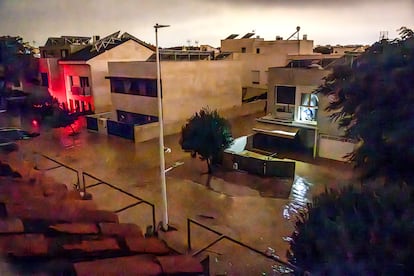Spain’s deadly floods: ‘When dawn broke, we saw the horror’
Mònica Torres, a photographer for EL PAÍS, recounts her harrowing experience during the night of the flash floods as she battled to save her belongings while water surged through her home in Picanya
On Tuesday, October 29, around 10 a.m., I get a call from Madrid asking for photos of the heavy rains in the province of Valencia. I feel around, talk to some friends and decide to head to Turís. On the way, I see a truck full of water that’s driven off the road. In Turís, they tell us that the worst-hit area is Chiva. On the way, I see a raging ravine, overflowing with turbulent water.
I arrive at Chiva by secondary roads and see that everything is flooded, full of stones and water, and the fields are muddy. It is 11:30 a.m. I take photos. I go to Catadau, where homes have been flooded. Then, on my way home, I notice that the ravines are dangerously full. I arrive home around 3 p.m. I live in Picanya, in a semi-detached house, facing the Poyo ravine. We go to the local bar and talk about what we have seen, whether there are plans to evacuate those who live near the ravine. And people make a bit of a joke: that the ravine doesn’t overflow; that it has never happened... They argue about who has seen it fuller, and we go home.
Jochen, my husband, has to go to Sedaví, and I am left alone. I look out over the ravine, which is always dry. People often walk their dogs in it. It is full of rabbits, teeming with life. Right now it is already half full. I go home and call the police. I ask if we should leave. They assure me there is no warning, but mention that the footpath down to the ravine has been closed — although I doubt anyone would dare go near it at this point. I send my photos to Madrid.
By 5 p.m., I start to have a kind of premonition. I call my husband. I decide to collect my things and bring them up to the top floor: my cameras, of course; food for the cat; food for us; water. I call a neighbor and ask him to check the garages. At first, he doesn’t pay much attention to me. It’s not raining. Soon, he sends me a horrified video. The water level in the ravine has risen even higher. We start to hear the sound of water pouring into the garages. I take out my photos, albums, everything that I consider most important, from the first floor of my three-story house.

At 7 p.m., Jochen doesn’t pick up the phone and panic sets in. The neighbor has gone to his parents’ house. Others start calling to tell me that the ravine has overflown. I open the door and see a sea of water. Then my husband calls me and tells me that he can’t come, and asks me not to go out alone. Stubbornly, I grab my suitcases and go downstairs to get into the car. Jochen finally shows up. He must have been the last to cross the bridge. He tells me to go inside. The water starts to rise like a mass and in seconds, the car wheels are submerged. We run into the house. We climb the stairs to the top floor and stay on the terrace. We watch the town turn into an ocean with waves passing over the only bridge still standing.
The water inundates street signs as it rushes out of the overflowing ravine. The neighbors’ children are also on the terrace. There is a lot of panic and fear. We try to calm down, to regroup. The candles I brought up are running out. We charge our cell phones with our laptops. We call the emergency services but the switchboard is jammed. Thank goodness my daughter, Maya, is not here. She studies in Alicante.
What we see and hear is not easy to describe. It grips hearts: screams of panic, people dragged by the water with nothing to hold on to, sofas, cars... A friend of Maya’s is holding on to his father, trying to get into the house, as cars float towards them. We see a neighbor perched on the fence; a woman on the first floor with water up to her neck... They finally manage to get her out. I make video calls to my family to try to reassure them, but in reality it seems like a goodbye, as my sister told me later. We are like this for two or three hours. And finally the water starts to recede. We go into the house and lie down for a while. I can hardly sleep, I can’t get the awful, metallic noise of the furniture and appliances hitting the ceiling out of my head.
When the sun rises, it is terrible. With the first light of dawn, we see the horror. It reminds me of the film The Impossible. It is like the landscape after a tsunami. Cars are piled up on top of one another, forming mountains and barriers. We fear many bodies may be underneath them. The emergency alert, warning of the danger of the ravine overflowing, finally arrives on our cellphones at 8 a.m. on Wednesday. Unbelievable. Why did it take them so long to warn us? Even I, the day before, in the morning, could see how the water was rising.
The crisis response has been pathetic. Deplorable. We have been without help for four days. Since there were robberies in the first days, we slept fearfully in our shattered home, without doors or windows. There is no water, no power, nobody helps us. We go out into the street with the uncertainty of not knowing if the neighbors have died. Everything is flooded, full of mud, you can’t walk anywhere, the entrances to homes are blocked and people are locked inside. The feeling of abandonment is absolute, but we have to rethink how to move forward.
Until a river of volunteers starts to arrive. It shocks us. Lots of young people, full of good will and good vibes, come with sticks, brooms, water and food, with whatever they can. They are the ones who help us. It is not the emergency services, nor the police, nor the Civil Guard. It is the people who save us and encourage us to continue, it is the community.
I will never forget the sea of people: 17-year-old girls, people I don’t know at all, my nephews and their parents, walking from Valencia, with chorizos, with water. I will never forget seeing a fellow photographer, as if he were a spirit, carrying two backpacks. People going crazy looking for shovels. We have found support, and that was what we needed, support.
By Thursday, they have already cleaned up the mud in the house. Friends also come on Wednesday. They remove trees, furniture, Jochen’s family piano, which is more than 100 years old, all is lost. I find the wedding ring that I had lost a year ago. Incredible. And Jochen found the heart-shaped stone that he picked up walking on the beach the day we met 25 years ago. People help us remove everything. There is nothing left of the table where my father sat for the last Christmas before he died, of the kitchen where we made meals or celebrated my daughter’s birthdays. Memories associated with things that no longer exist. I have to keep them in my heart now. But we are alive.
Now we have to find a house, move, set up a home. Manage everything that’s on my mind: the screams of panic, the floating bodies, the terror of the water, the horrible sound, the fear I felt when Jochen didn’t answer his phone... We’re exhausted. But we have to start again.
Sign up for our weekly newsletter to get more English-language news coverage from EL PAÍS USA Edition
Tu suscripción se está usando en otro dispositivo
¿Quieres añadir otro usuario a tu suscripción?
Si continúas leyendo en este dispositivo, no se podrá leer en el otro.
FlechaTu suscripción se está usando en otro dispositivo y solo puedes acceder a EL PAÍS desde un dispositivo a la vez.
Si quieres compartir tu cuenta, cambia tu suscripción a la modalidad Premium, así podrás añadir otro usuario. Cada uno accederá con su propia cuenta de email, lo que os permitirá personalizar vuestra experiencia en EL PAÍS.
¿Tienes una suscripción de empresa? Accede aquí para contratar más cuentas.
En el caso de no saber quién está usando tu cuenta, te recomendamos cambiar tu contraseña aquí.
Si decides continuar compartiendo tu cuenta, este mensaje se mostrará en tu dispositivo y en el de la otra persona que está usando tu cuenta de forma indefinida, afectando a tu experiencia de lectura. Puedes consultar aquí los términos y condiciones de la suscripción digital.









































